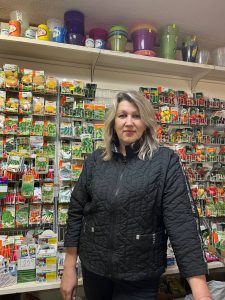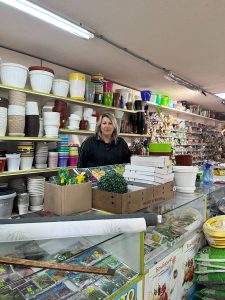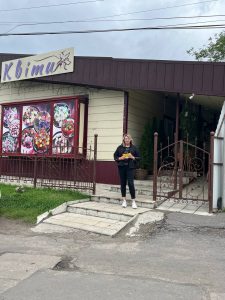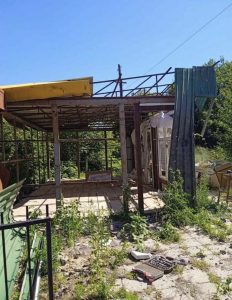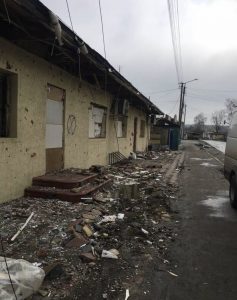
- About BDF
- Programs
- To banks
- For enterprises
- News BDF
- Public information
- Home
- Success stories
- The Land Holds: How a Woman Entrepreneur from Trostianets Revives Her Business after Occupation and Invests in Energy Independence
The Land Holds: How a Woman Entrepreneur from Trostianets Revives Her Business after Occupation and Invests in Energy Independence
When Russian troops occupied Trostianets in Sumy region in 2022, entrepreneur Lina Okhrimenko lost almost everything. One of her stores was destroyed, others – looted. The business she had been building since 1997 was under threat. But just a few months after the city was liberated, Lina, together with her family, began not only to restore her own business but also to help others – delivering humanitarian aid, food, and medicine to the war-torn city.
“It wasn’t the time for trade,” she recalls. “People were giving birth in the streets, there was no bread, no baby food. My family and I simply got in the car and started delivering humanitarian aid. It was our shared cause.”
Return to entrepreneurship
Before the full-scale invasion, Lina had four retail locations, selling seeds, clothing, footwear, and souvenirs. But after the occupation, only what could be hidden in attics, barns, or with friends remained. Later, the family began rebuilding the business from scratch – first opening a grocery store, as that was where the need was greatest.
“We brought in sausage, dumplings, dairy. But as soon as the blackouts started – we had to stop. The products spoiled right before our eyes. Once, they even returned goods to us – that’s when I decided: that’s it, I’m shutting down the food,” explains Lina.
Over time, Lina restored one of her stores – “Zemledar,” which specializes in garden and farm products. Partners allowed her to take goods with deferred payment. And with support from a government program and international donors, the entrepreneur purchased display cases, a tablet for inventory, and updated the assortment. Step by step, the business began to revive.
Investment in stability
After the blackouts and losses in the grocery sector, Lina changed her approach to energy consumption. Thanks to a grant project “Support for Energy Sustainability of Micro and Small Enterprises in Ukraine,” she received funds to install an autonomous solar power station, which will consist of 18 panels with a capacity of 7.65 kW, an 8 kW inverter, and a battery. “Electricity is not just expensive now – it might be unavailable. And I can’t afford to shut down again,” she says.
The equipment purchased by the entrepreneur is planned to be installed on the roof of a store in the center of Trostianets. Currently, the premises are leased, but Lina plans to develop her business there in the future – creating a shopping area with kiosks and a small café inside the store. “I decided to put the solar panels there because it’s an investment in development. There’s lots of space, a good roof, lots of sunlight. It’s a location with potential. And I want to be ready for that,” she explains.
Lina plans for the new power source to cover the store’s electricity consumption, allowing for the launch of air conditioning and heating and saving tens of thousands of hryvnias monthly.
Small business with great resilience
After the occupation, Lina lost not only retail outlets but also her team: only two of the seven sellers remained. Some clients left, others are gradually returning. But the business is reviving. Today, she sells seeds, agrochemicals, clothing, and shoes, hires people again, and most importantly – dreams again.
“I don’t know how we would have survived without help. Thanks to the solar panel system, I don’t have to worry whether the store will withstand the next blackout. I can plan, open new things, and not just patch up the old,” says the entrepreneur.
This publication was prepared within the support of the international cooperation project “Energy resilience support for micro and small enterprises in Ukraine” under the ReACT4UA Program (Utilization and Implementation of the Association Agreement between the EU and Ukraine in the field of Trade) that is co-funded by the German Government and the Norwegian Agency for Development Cooperation (NORAD). It is implemented by the German federal company “Deutsche Gesellschaft für Internationale Zusammenarbeit (GIZ) GmbH”.
The project aims to increase the resilience of the Ukrainian economy to recurrent power outages and assure business continuity of Micro, Small and Medium Enterprises (MSMEs) by financially supporting solutions for an uniterrupted access to electricity.
The content of this publication is the sole responsibility of the Business Development Fund and does not necessarily reflect the views of the Government of Germany, NORAD, or GIZ.
